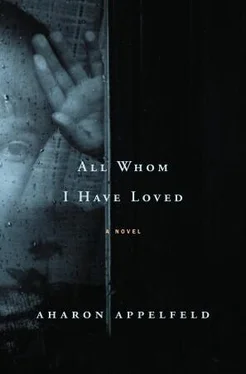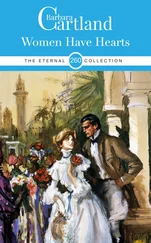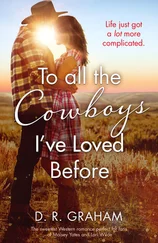“Dear brothers,” he began, “may the light of the Messiah be upon you and may your eyes see only the light and only the good. Do not quarrel among yourselves, for such dissention comes from darkness and from Satan. Beloved brothers, do not fight, for fighting removes us from His light and expels us into darkness.”
The old man was dressed in peasant's clothing and spoke Ruthenian. A harsh light radiated from his long, gaunt face. I did not understand most of what he said, but I knew that he was talking about God and about the light and about people who are drawn to the darkness and refuse to see the light. He also spoke of Jews who deny the Messiah and have gone astray and lead others astray. There was great stillness, and the voice of the old man carried through the hall like a frightening threat. But apparently people were not afraid — they sat alertly, as if the old man was about to lead them into a world filled with goodness.
When the old man had finished, two strong men went up to him, supported his forearms, and helped him to the doorway at the back. No one rose from his seat; it was as if everyone had stopped breathing. For a long time the silence hung in the air until a peasant stood up and called out, “There is none like our God and there is none like our Messiah!” and immediately the hall burst into mighty song.
Once Halina had taken me to a church and shown me the altar. It was a small, wooden church with angels on its windows. The priest was wearing his ceremonial robes and reading from a big book, and the choir began to sing whenever he finished a section. I do not know whether this was a festival or a funeral, but in any case, then, too, the priest had called out, “There is none like our God and there is none like our Messiah!”
We went outside and Father lit a cigarette. The night was dark and the gates of heaven, which only a moment ago had seemed open, suddenly closed.
We crossed the street and waited at the tram station. There was no one there. I wanted to ask Father why the heavens were sealed off and for how long they would be sealed off, but his head was buried so deep in the collar of his coat that I didn't dare. The tram was not long in coming, and we sat in the front seat, as if we were about to set out on a long journey to a place where the heavens are always open and you can see God clearly, sitting on His throne.
The rain grew fiercer each day, and hail fell in the evening. Father would come back in the dark and immediately start to make dinner. The dampness that he brought with him from outside mingled with the scent of the wood burning in the stove. We mostly ate potatoes, cheese, and yogurt, but sometimes Father brought corn pie from the city and we dipped it in sour cream. When he was in a good mood, he would show me drawings his students made.
“Very nice,” I said — an expression that Mother often uses.
“Where did you get that shallow expression?” Father wondered.
“Was I wrong?”
“ ‘Very nice’ is not a nice expression,” Father said, and chuckled.
My life at Storozynetz was forgotten, and Mother, too. When we walked around in the city, I sometimes thought I saw Halina. Once I pulled my hand away from Father and ran to a woman who looked like her. Her memory evoked sunlight for me, and I told myself that in summer she would return and we'd walk along the river. After our meal, Father sat and looked at a book, and I leafed through one of his many art volumes. The children's books that I'd brought with me from Storozynetz no longer interested me. I felt that the stories and pictures in them had died, and reading them wouldn't bring them back to life. Under a picture in one of Father's books I read the word “portrait,” and I asked Father what it meant. Father looked at me with a level gaze, and for the first time I saw two lines etched the length of his face. I sensed the hidden fury in them and I was scared.
“Why are you scared?”
“I'm not scared.” I tried to deny it.
This time Father stood his ground. “You have to be strong and you mustn't be afraid. Fear is indecent. A man has to uproot it from his heart.” I marveled at these full sentences coming from him — he usually spoke in words and not in sentences.
Sometimes Father raised his head from his book and asked me something. It was hard for me to explain to him what I felt or thought. Since Halina had left me, it was hard for me to talk. With Halina I would chatter, joke, and even invent words that would make her laugh. Now I found it hard to put a sentence together.
Most of the daylight hours I was at home alone, and when the rain let up, I would go out and stand on the riverbank. The landlord came again and asked me about praying. It was hard for me to lie to him, and I said, “No.” A sad smile appeared on his lips, and he told me that years ago, Jews who believed lived in these parts. They would pray every day, to say nothing of Sabbaths and other festivals.
“And where are they?”
“They've scattered.”
“Why?”
“Who knows?”
“And there are no more Jews who believe?”
“There are, but fewer and fewer.”
Strange, it was easier for me to talk with this Ruthenian peasant than with Father. The landlord told me about the Jews in the countryside who used to till their land like the Ruthenians, keeping God's commandments, not working on the Sabbath, and giving to the needy. He seemed to miss them.
“Is it good to be a Jew?” I asked for some reason.
“It's a great privilege, my son. God spoke to the Jews at Mount Sinai and gave them the Torah. Since then the entire world knows that there is a God in heaven and that the world isn't up for grabs. You see?”
“So why did they throw stones at me and call me a dirty Jew?”
“They're afraid of you.”
“Why are they afraid of me?”
“Because you're the son of a king.”
“Me?”
“You.”
It was hard for me to really comprehend his words, and I asked, “Why am I the son of a king?”
“Because God spoke to your forefathers and adopted you as his son.”
“I'm only nine years old.”
“You're a little prince, and when you get bigger, you'll be a prince.” Then he added in a sad tone, “The Jews no longer know who they are. Once they knew, but now they've forgotten and we have to remind them. Do you understand me?”
“A little.”
“They've forgotten that they're the sons of kings.”
I asked Father about what the landlord said. Father was brief as usual and said, “He's a man who believes.”
“And we don't believe?”
“Not to that extent.”
Mother explained; Father never explained. He hated explanations. Once, when were sitting in a tavern, I asked him why he didn't explain, to which he responded, “If you understand, you understand; explanations are useless.”
One morning the door opened and there stood Mother. She had cut her hair and was wearing a long, heavy coat. I almost didn't recognize her. “It's me, my dear,” she said, and I went over to her. She tried to pick me up, but her heavy sleeves got in the way, and for a moment she stayed bent over my neck, embarrassed by her failure. But then she immediately took my face in her hands and kissed it.
“How are you?” she asked, taking off her coat. A little of the strangeness left her, and I saw then how her face had filled out and her hair had faded.
“You're alone?”
“Yes.”
“Where's Father?”
“At work.”
“Strange,” she said, as if only now had she grasped that she was there.
“Why strange?”
“I don't know.”
She stood there, looking around the room. It was a mess, and she didn't like the soot. She put her hand to her forehead, a gesture that I remembered well, a gesture of dissatisfaction and sometimes despair.
Читать дальше












